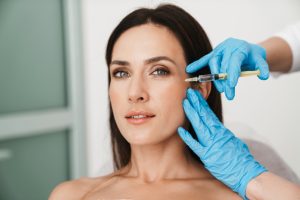
Botox: More Than a Cosmetic Treatment
When most people hear the word Botox, they think of wrinkle reduction and youthful skin. While Botox is indeed one of the most popular cosmetic treatments worldwide, its benefits extend far beyond aesthetics. At Total Health Elevated in Northridge, we use Botox not only for facial rejuvenation but also to address a variety of medical conditions that can improve a patient’s quality of life.
How Botox Works
Botox is derived from a purified form of botulinum toxin, a naturally occurring protein. When injected in small, controlled doses, it temporarily relaxes targeted muscles by blocking nerve signals. This effect reduces unwanted muscle contractions, which can smooth wrinkles, ease pain, and alleviate certain medical issues.
Medical Conditions Botox Can Help Treat
Chronic Migraines
The FDA has approved Botox for the treatment of chronic migraines. By injecting it into specific areas of the head and neck, Botox can reduce the frequency, severity, and duration of migraine headaches, offering relief to those who have struggled with conventional medications.
Muscle Spasms and Dystonia
Botox can help patients experiencing uncontrolled muscle contractions, such as those caused by cervical dystonia or spasticity from neurological conditions. By relaxing the affected muscles, Botox restores range of motion and comfort.
TMJ and Jaw Pain
Tension and overuse of jaw muscles can cause temporomandibular joint (TMJ) pain. Botox injections into the jaw muscles can reduce clenching and grinding, providing lasting relief.
Excessive Sweating (Hyperhidrosis)
For patients who suffer from excessive sweating, Botox can block the nerve signals that activate sweat glands. This treatment is especially effective for the underarms, hands, feet, and face.
Cosmetic Benefits: The Popular Side of Botox
While the medical applications are impressive, Botox’s cosmetic benefits remain one of its biggest draws. Common uses include:
- Smoothing forehead lines
- Reducing crow’s feet
- Softening frown lines
- Lifting the brows for a refreshed look
Results typically appear within 3–7 days and can last 3–4 months, making Botox a convenient, low-maintenance option for those looking to enhance their appearance.
Why Patients Choose Botox at Total Health Elevated
Our Northridge clinic offers Botox treatments performed by trained medical professionals who focus on precision and natural-looking results. We tailor every treatment plan to your goals—whether you’re looking for wrinkle reduction, migraine relief, or medical symptom management.
The Procedure and Recovery
Botox injections are quick—often completed in 15–30 minutes—and require little to no downtime. You may experience slight redness or swelling at the injection site, but this typically fades within a few hours. Most patients return to normal activities immediately.
Combining Botox with Other Therapies
At Total Health Elevated, we often combine Botox with other services such as microneedling, PRP therapy, or hormone optimization for a more comprehensive approach to wellness and rejuvenation. Our goal is to help you look and feel your best, inside and out.
Call to Action
If you’ve been curious about Botox for cosmetic or medical reasons, now is the perfect time to explore your options. Contact Total Health Elevated in Northridge today at 818-923-5405 or visit www.totalhealthelevated.com to schedule your consultation. Discover how Botox can help you feel more confident, more comfortable, and more like yourself.
FAQ?
What exactly does Botox do?
Botox, or botulinum toxin, is a neurotoxin that works by temporarily paralyzing or weakening muscles. In cosmetic applications, it’s primarily used to reduce the appearance of wrinkles by blocking nerve signals that cause muscles to contract, leading to smoother skin. Beyond aesthetics, Botox is also used to treat various medical conditions, such as muscle spasms, excessive sweating, and migraines.
Is Botox 100% safe?
Botox injections are relatively safe. Still, you shouldn’t get this treatment if you’re pregnant, breastfeeding or have: Neuromuscular disease. Drooping eyelids (ptosis).
What is a good age to get Botox
There isn’t a single “good age” to start Botox, as it depends on individual factors like skin type, lifestyle, and desired results. However, many experts suggest that preventative Botox, aimed at delaying the formation of wrinkles, is often recommended in the mid-to-late 20s and early 30s. This is when dynamic wrinkles (those that appear with facial expressions) may start to become noticeable. Starting early can help maintain a youthful appearance and potentially reduce the amount of Botox needed later in life, according to some medical and cosmetic resources.
